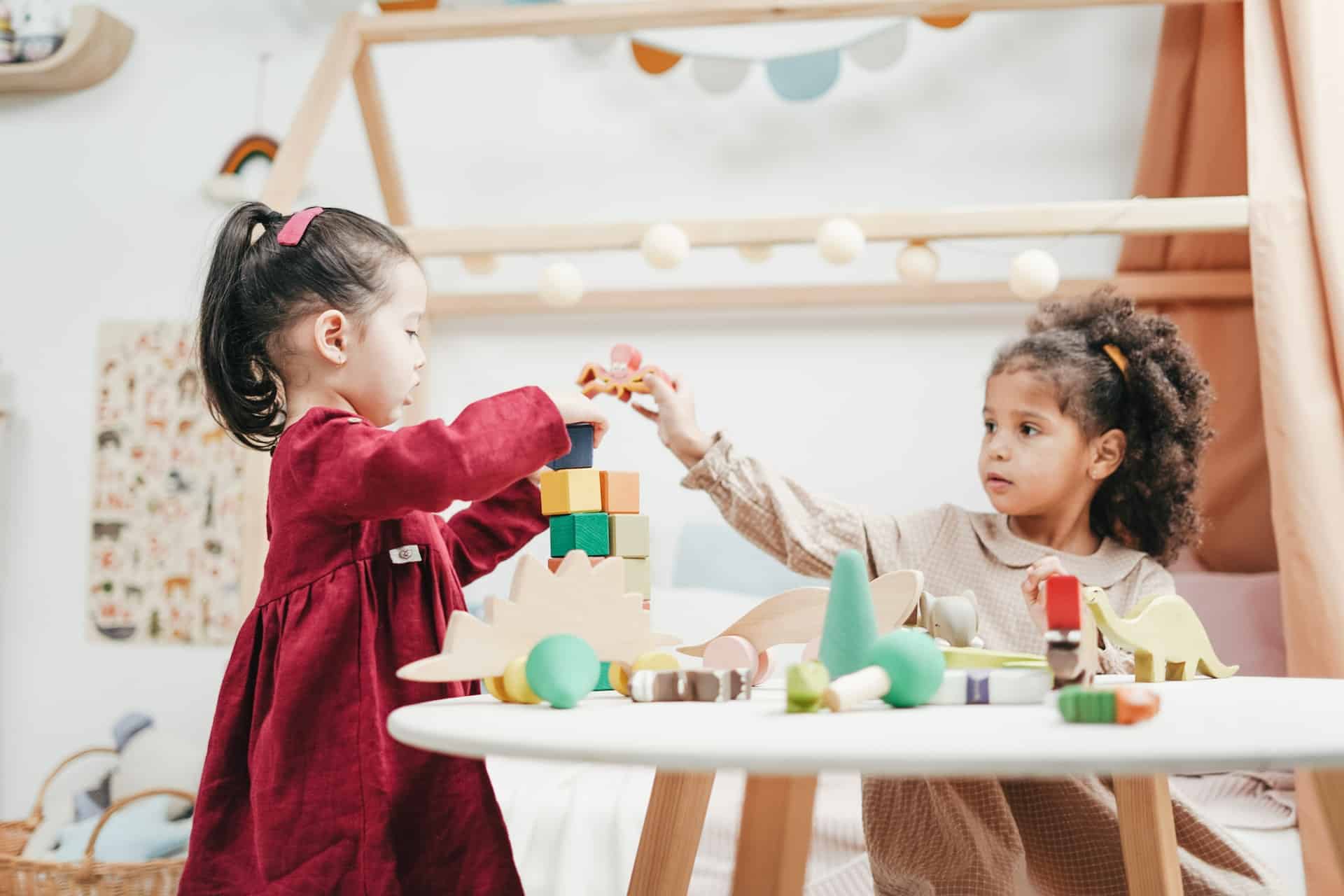
“Mine!” was one of the first words in my toddler’s vocabulary. While at first I found this possessiveness cute and endearing, I became embarrassed by it when we found ourselves at a playdate. “Sharing is caring,” another Mom said as my toddler white knuckled the toy shopping cart, veering around another child who was making a move for it. We clearly weren’t caring about sharing. My toddler had happily shared her cheerios with me that morning, popping them playfully into my mouth. So why wouldn’t she share her toys?
Of course, as adults, we know sharing is the socially acceptable thing to do. That’s because we have developed empathy and compassion for others. We know it feels good when others share with us so we want to share with them. But the concept of sharing involves social and emotional skills that toddlers haven’t developed yet. Just as we know a toddler doesn’t have the fine motor function to tie their own shoe laces, we shouldn’t expect them to share when they aren’t developmentally ready to do so.
This can seem really frustrating to parents, especially when your toddler won’t share at a playdate and you really want to meet a new mom friend. Rather than being embarrassed by your toddler’s declarations of “mine”, consider one of these responses when your toddler won’t share:
1. Recognize that Not Sharing is Developmentally Normal
Toddlers are intrinsically focused on their own growth and development. So much so that they may seem ego-centric. This self-centered behaviour is developmentally normal and in no way a reflection of your parenting so if your toddler won’t share, there’s really no need to be embarrassed by it.
2. Read Books to Build Your Toddler’s Capacity for Empathy
When reading books with your toddler, examine the facial expressions of the characters. Say “this little girl looks sad. Why do you think she’s sad.” Identifying and labeling the emotions of characters in the book can help them to recognize emotions in others, and themselves. If not sharing is becoming an issue at every playdate, try finding books that deal with the issue and identify the emotions of the children in the story when their friend won’t share with them.
3. Acknowledge and Validate Your Toddler’s Feelings
Imagine you’re laying on the beach enjoying a good book and someone rips it from your hands because they want to read it. That wouldn’t feel very good, especially if you’re in the middle of a juicy part of the story. Take the time to validate your toddler’s feelings about not wanting to share. “You both want to play with the shopping cart. That’s hard. You aren’t done with it yet and your friend wants to play with it.” Validating your child’s feelings helps them to feel heard and understood and is the place from which you can move towards finding a solution.
4. Redirect to Another Toy
If your child is eyeing a toy that another child is using, rather than try to force them to share, you can try saying: “I know you really want to play with that shopping cart but it looks like (other child’s name) is playing with it right now. Let’s look at these colourful building blocks. Do you want to knock down my tower?” Toddlers are easily distracted by the possibility of knocking things down.
5. Put Away Favourite Toys
If you are having another child over for a playdate, talk to your child in advance about what toys will be available for the play date. Putting away any favourite or “special” toys your toddler doesn’t want to share is one way to avoid the “sharing is caring” struggle.
6. Introduce Turn Taking
Toddlers claim ownership over anything that is in their hands. If your toddler won’t share, rather than forcing them to share a toy they are enjoying in the moment, ask your child to tell you when they are finished with the toy. Saying “all done” tells everyone the toy is now available for someone else to play with. You may even ask them to put the toy back on the shelf. Once it’s on the shelf it’s available for another child to use. This introduces the concept of turn taking. Don’t place a time limit on when they need to be done. Saying “all done” or putting the toy back puts the power in your toddler’s hands, allowing them to determine when they are ready to move on to the next item that catches their interest.
Remember, children’s understanding of sharing and turn-taking doesn’t typically happen until around age 3 or 4. With a little guidance, this skill will come in time.
Source and Image: Parents Canada
—
Discovery Point Nursery and Academy is a daycare in Woodbridge, Vaughan, Ontario